Before the Movement is a history of Black legal lives that tries to widen the way we think about African American history more generally. At one level, it tells a story about one particular area of law: where our modern concept of civil rights comes from, and what it eclipsed, and how Black people used civil rights as far back as the 1830s. At another level, it is a story of Black life.
Article continues after advertisement
From the start, I knew I wanted it to be about Black people. What I mean is that Black history is often treated as if it were synonymous with the history of race relations. So, although it talks a great deal about race—including how Black people using their civil rights helped make the law—the heart of the book is about Black people’s loves and angers and loneliness, their efforts to get ahead or at least stay afloat, their mistakes and embarrassments, their fights, their ideas, their hopes and disappointments, in all their messy humanness.
Before the Movement is not a family history but my approach to Black history—the kinds of questions I ask—is deeply influenced by my own family history. The book begins with a story about my great-great-great-uncle, who was a slave in Cumberland County, Virginia; it ends with my mother’s experience as one of the first Black law students at Penn; and there are family stories woven here and there throughout.
*
Patricia J. Williams, The Alchemy of Race and Rights: Diary of a Law Professor
A classic of Critical Race Theory and still searingly relevant, these essays mix doctrine with stories to probe the variegated, seen and unseen connections between law and society. From her experiences as a law professor to her discovery of the bill of sale for her great-great-grandmother, Williams lays bare the many contradictions and strange assumptions that underpin legal scholarship, and urges a more humane way to “think like a lawyer.” Legal academia may seem like an esoteric subject but you need only glance at the Supreme Court’s recent decisions to be reminded how powerfully the tides of thought sweeping across elite law schools can wind up changing our lives—for both good and ill.
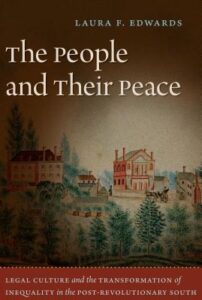
Laura F. Edwards, The People and Their Peace: Legal Culture and the Transformation of Inequality in the Post-Revolutionary South
Drawing from prodigious research in records from local courts, Edwards recovers a whole world of ground-level activity, thinking, and assumptions about law, and then uses that almost unmapped legal world to rethink the legal history we think we know—the world of “the law” as written on the books. She reveals a forgotten world where local law was about protecting “the peace,” and then shows how, beginning in the 1830s, that world got redefined around individual rights, a transformation that proved a double-edged sword for women, African Americans, and other subordinated minorities.
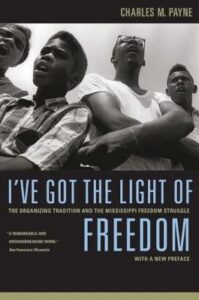
Charles M. Payne, I’ve Got the Light of Freedom: The Organizing Tradition and the Mississippi Freedom Struggle
A classic account of the “community organizing” tradition and how it powered the Black freedom struggle in a notoriously violent state. Payne beautifully shows that the famous activists of the 1960s depended crucially on networks and advice from previous generation of activists “who worked in obscurity” in the 1940s and 50s and who built up both community networks and family networks that the SNCC students would eventually plug into. This is a deeply humane, bottom-up history with a subtle sweep, one that refuses easy conclusions about local people and their shifting beliefs about what “freedom” means.
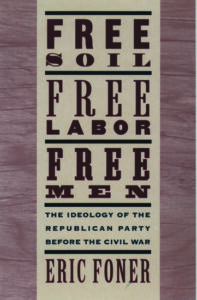
Eric Foner, Free Soil, Free Labor, Free Men: The Ideology of the Republican Party before the Civil War
Free Soil, Free Labor, Free Men tells how American politics utterly transformed between 1840-1860 to pave the way for the last major new political party to emerge: the Republicans. The party’s core ideas about race and the place of African Americans in a free society, its economic worldview of America as a nation of small independent entrepreneurs—already outdated even then—and its conviction that poverty is a moral failure that neither unions nor government can address, carried Abraham Lincoln to the White House, and still echo today.
Derrick A. Bell Jr., “Brown v. Board of Education and the Interest-Convergence Dilemma,” Harvard Law Review 93 (1980): 518-33.
This is not a book but rather a law review article, and a short one at that. But it has been foundational to two generations of legal scholars who work on race, and its central insight helps make sense of some of the core mysteries I ran into while writing my book. Bell spent more than ten years working in the Justice Department and the NAACP Legal Defense Fund before he became a law professor. In 1980, he reflected critically on his own work in broad perspective to venture a general theory of legal change: that Black people’s fortunes will depend, not on the wise decisions of a benevolent Supreme Court or on the brave litigation of civil rights lawyers, but rather on whether Black people’s interest in racial equality “converges with the interests of whites.”

Hendrik Hartog, Someday All This Will Be Yours: A History of Inheritance and Old Age
For decades, this trailblazing legal historian has shed new light on hidden assumptions lurking behind some of the most important parts of American life: childhood, marriage, the legal status of New York City, and, in this book, what it means to grow old in an individualistic, free-market society. By looking at law not only from the top down but also from the bottom up, he lets us glimpse how ordinary people’s ideas about law have helped make the official law on the books. His deeply humane approach to legal history has profoundly influenced a generation of scholars, including me.
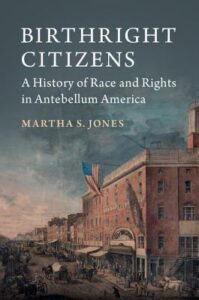
Martha S. Jones, Birthright Citizens: A History of Race and Rights in Antebellum America
Jones upends the familiar story of the origins of American citizenship. In her view, citizenship had less to do with famous cases like Dred Scott or from the Reconstruction Congress, Jones argues, than with everyday legal encounters, political petitions, and “actions in the streets” of places like Baltimore. Spurred by a wave of anti-Black Maryland laws, free Black Baltimoreans claimed “an unassailable belonging, one grounded in birthright citizenship,” principles that eventually were written into the Fourteenth Amendment. In our own time, when one major political party is planning mass deportations and questioning birthright citizenship, Jones’s message could not be more timely.
__________________________________
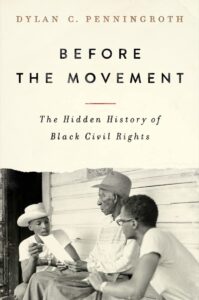
Before the Movement: The Hidden History of Black Civil Rights by Dylan C. Penningroth is available from Liveright Publishing Corporation.
